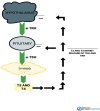Hypothyroidism and Depression: A Narrative Review
- PMID: 36003348
- PMCID: PMC9392461
- DOI: 10.7759/cureus.28201
Hypothyroidism and Depression: A Narrative Review
Abstract
There has been an established relationship between hypothyroidism and depression. Studies have demonstrated that somatostatin and serotonin influence the hypothalamus-pituitary-thyroid axis, which links hypothyroidism to depression. Multiple studies concluded that undiagnosed, untreated, undertreated patients with hypothyroidism are at increased risk of developing depression. Autoimmune thyroiditis is also associated with an increased risk of depression. Elevated thyroid-stimulating hormone (TSH), antithyroglobulin (TgAb), and thyroid peroxidase antibodies (TPOAb) levels have all been linked to depression and an increased risk of suicide. Moreover, hypothyroidism is known to be one of the leading causes of treatment-resistant depression. Treating underlying hypothyroidism with thyroid replacement therapy could significantly improve mood disorders such as depression. Levothyroxine therapy is also used as adjunctive therapy to antidepressants in the management of depression, and it is known to improve the symptoms of depression rapidly when compared to antidepressants alone. This review strengthens the link between hypothyroidism and depression, and it also demonstrates how treating the underlying hypothyroidism in people who have been diagnosed with depression will be very beneficial.
Keywords: depression; depression in hypothyroidism; hypothyroidism; levothyroxine; subclinical hypothryroidism; thyroid peroxidase antibodies; thyroid replacement therapy; treatment-resistant depression.
Copyright © 2022, Nuguru et al.
Conflict of interest statement
The authors have declared that no competing interests exist.
Figures
References
-
- Lifetime and 12-month prevalence of DSM-III-R psychiatric disorders in the United States. Results from the National Comorbidity Survey. Kessler RC, McGonagle KA, Zhao S, et al. Arch Gen Psychiatry. 1994;51:8–19. - PubMed
-
- Borderline hypothyroidism and depression. Haggerty JJ Jr, Prange AJ Jr. Annu Rev Med. 1995;46:37–46. - PubMed
-
- Depression and autoimmune hypothyroidism-their relationship and the effects of treating psychiatric and thyroid disorders on changes in clinical and biochemical parameters including bdnf and other cytokines - a systematic review. Kotkowska Z, Strzelecki D. Pharmaceuticals (Basel) 2022;15 - PMC - PubMed
-
- Neuroendocrine evidence for an association between hypothyroidism, reduced central 5-HT activity and depression. Cleare AJ, McGregor A, O'Keane V. Clin Endocrinol (Oxf) 1995;43:713–719. - PubMed
Publication types
LinkOut - more resources
Full Text Sources

